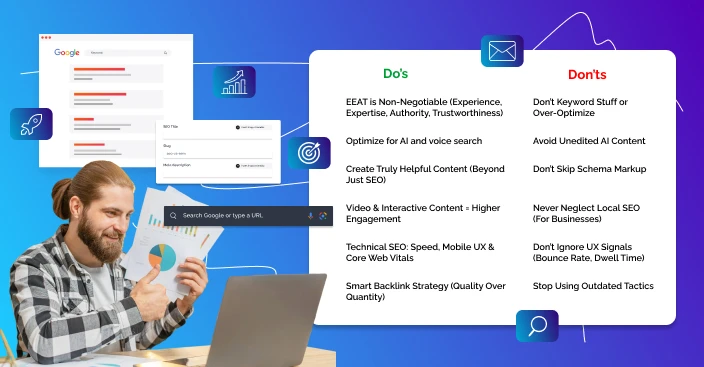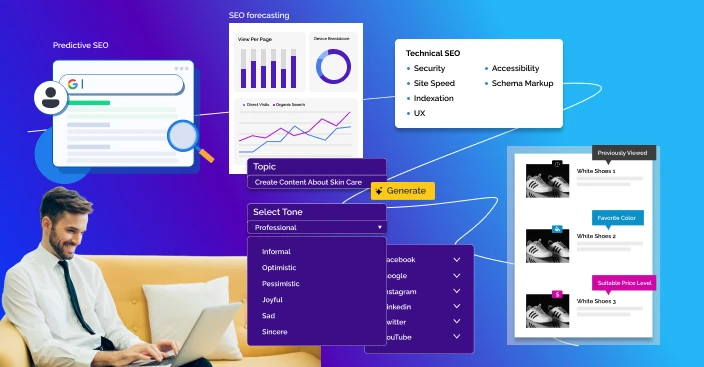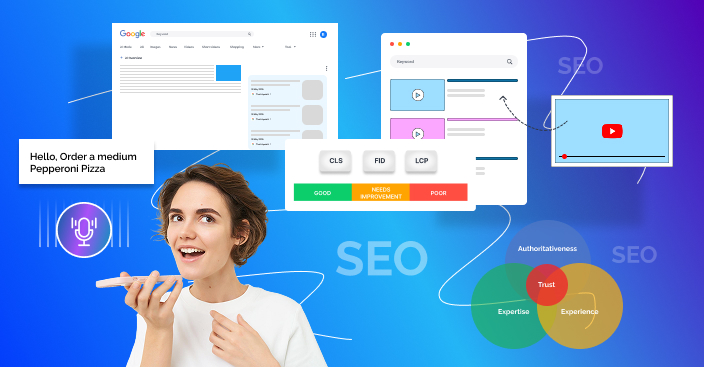Search Engine Dos and Don’ts: A Guide to the Search Engine Practices

Table of Contents
Search Engine Optimization (SEO) in 2025–26 is no longer just about keywords and links,it’s about user intent, experience, and machine learning-driven ranking algorithms.
With nearly 93% of all online experiences starting on a search engine (Statista, 2025), businesses can’t afford to ignore SEO if they want to remain visible and competitive in an AI-first world.
In this blog we will find out what are the dos and don’ts of SEO practices and why it’s matter for your business in 2025.
Why SEO Still Matters in 2025–26
Digital strategy still relies heavily on SEO. 93% of online encounters still start with a search engine, despite the growing popularity of emerging channels like voice assistants, social commerce, and AI chatbots.
People’s first reaction is to “Google it,” whether they’re trying to find a restaurant, researching a product, or resolving a technical problem.
One thing this involves for businesses is that they are invisible if they are not ranking.
Additionally, consumers are more knowledgeable and dubious than ever. Before making a choice, they thoroughly investigate, evaluate, and compare options.
Being included in the top search results gives your brand visibility, authority, and trust,all of which have a direct impact on conversions.
SEO makes sure you appear when it counts most, whether local customers are looking for “best salons near me” or business-to-business buyers are shopping for SaaS technologies.
Types of SEO: Local vs Global
SEO can be customized to fit a business’s geographic goals.
- Local SEO focuses on appearing in location-specific searches, such as “best bakery near me.” With 61% of mobile users contacting a local business within 24 hours of searching (Think with Google, 2025), it’s vital for brick-and-mortar stores.
- Global SEO targets audiences at a national or international level, making it ideal for e-commerce or SaaS businesses.
SEO can be applied at both the local, national, and international levels. Optimizing a business’s webpage to appear whenever a user searches for a product or service at the local level is called local search engine optimization.
Whereas the latter focuses on searches at the national and international levels. SEO companies offer a wide range of SEO-related services to mid-sized to small-scale businesses.
Internet marketing, which lies at the core of marketing for businesses of every scale, has a significant dependency on SEO.
The strategy of internet marketing takes into account many factors. That includes the mechanisms of search engines, the algorithms that run them, what people are searching for, the keywords they use for the search, and, importantly, which search engines users prefer.
Despite the rise of voice search, AI chatbots, and social media commerce, SEO remains a crucial factor in achieving digital visibility.
Over 70% of B2B buyers still start their research with a generic Google search (HubSpot, 2025). Proper SEO ensures your brand is discoverable at every stage of the customer journey.
Top SEO Trends and Stats for 2025–26
AI, user behavior, and modifications to Google’s content processing and presentation are all changing the SEO scene in 2025. Remaining competitive requires an understanding of these trends:
1. Voice and Conversational Search
Over 50% of all searches in 2025 are expected to be voice-activated (Google Trends, 2025). People no longer just type “best hotels Paris”—they ask, “What are the best affordable hotels in Paris with breakfast?” Optimizing for natural language queries and featured snippets is key.
2. Google’s Search Generative Experience (SGE)
SGE uses AI to provide summarized answers right at the top of search results. This leads to more zero-click searches. To stay relevant, websites must now optimize for informational intent, snippet-worthy answers, and structured data.
3. Core Web Vitals Are Non-Negotiable
Google still prioritizes speed, stability, and mobile responsiveness. Sites with slow load times or broken UI see a 23% higher bounce rate. Optimizing for LCP, FID, and CLS remains a top ranking factor.
4. Video SEO Gains Traction
Web pages with embedded video content receive 53% more organic traffic and 2x average time on page. Short-form educational videos and YouTube SEO are increasingly important for ranking and engagement.
5. E-E-A-T and Brand Trust
With the rise of misinformation, Google now gives higher preference to websites showing Experience, Expertise, Authoritativeness, and Trustworthiness (E-E-A-T). Having author bios, transparent sourcing, and updated content can now affect your rankings.
These trends show that SEO is evolving beyond keywords,it’s about understanding users, building trust, and optimizing experiences.
Let’s consider a few dos and don’ts for search engine optimization
Dos
- Prioritize User Experience (UX): Create a user-friendly and mobile-friendly website that loads quickly.
- Write for Humans, Optimize for Machines: Update old content and post fresh content frequently. Identify relevant keywords and incorporate them into the title, body, and meta descriptions of your content. Quality content is the king. Engaging and thoroughly researched content consistently draws organic traffic.
- Leverage AI Tools for Better Insights: Check your website regularly to identify backlinks and prevent a Google penalty. Create a sitemap. This helps search engines index your website’s pages.
- Create Value-Driven, Linkable Content: Longer content covers more keywords, allowing search engines to bring your webpage to the forefront. Internal links also help search engines quickly locate and index your website.
- Audit Backlinks Proactively: Utilize AI tools like Ahrefs or SEMrush to identify toxic backlinks that could harm your rankings. Ensure that your website is easy to link.

Don’ts
- Avoid usage of irrelevant links or links that are not relevant to your content.
- Usage of too many keywords can stuff your content.
- It is advisable not to get links from blog networks.
- The usage of cloaking techniques and doorway pages can lead to penalties by search engines.
- Write or be a guest blogger for only reputable sites. Any association with a website of a quality lower than yours can prove to be costly.
- Over-optimizing anchor links also gets penalized.
- Don’t ignore the crawl budget. Too many low-quality pages can waste crawl budget and affect indexing.
- Avoid link schemes, Buying links or participating in reciprocal link farms will get you penalized by Google’s SpamBrain algorithm.
- Copied content doesn’t get you anywhere in the long term. Avoid copying.
- It is advisable not to get linked to a webpage that already has too many external links. Too many external links signify that the webpage quality is poor.
Ethical and Unethical SEO
As search engines evolve, so do SEO strategies. Here’s a breakdown of what’s considered ethical (White Hat) vs risky (Black Hat) in 2025:
| Technique | White Hat SEO | Black Hat SEO |
| Target Audience | Human-first | Search engine-first |
| Practices | Quality content, keyword research, and ethical backlinks | Cloaking, doorway pages, keyword stuffing |
| Risk Level | Low | High |
| Results | Long-term, stable | Short-term, unstable |
| Tools | GA4, Search Console, Surfer SEO | Hidden scripts, bots, PBNs |
White Hat SEO is a search engine optimization technique, tactic, and methods that follow search engine terms of policies and rules. These techniques target human audiences rather than search engines and are also referred to as Ethical SEO techniques.
White Hat SEO is search engine optimization techniques, tactic, and methods that follow search engine terms of policies and rules. These techniques target human audiences rather than search engines and are called Ethical SEO techniques. If you want to learn more about White Hat SEO and how to implement it effectively, checking out this page for valuable insights and best practices is beneficial.
On the other hand, Black Hat SEO refers to search engine optimization techniques that do not abide by the search engine policies and rules. Often termed unethical SEO techniques, this practice targets search engines rather than humans.
Black Hat SEO is generally meant for achieving short-term returns, whereas White Hat SEO has a long-term perspective.
An example of White Hat SEO would be a website that is well optimized for search engines, yet concentrates on organic rankings. Thorough keyword analysis, backlinking, link building and using quality and useful content are some of the ethical SEO practices.
Examples of Black Hat SEO would be the usage of unrelated keywords, page swapping, stuffing the webpage with keywords and using the poor-quality content. Let’s have a detailed look at the techniques.
White Hat SEO
- This conforms to all the policies and guidelines of search engines.
- If users see search engine-indexed and ranked content, it indicates the use of White-Hat SEO techniques.
- This technique does not involve any deception.
- It ensures that web page content is of good quality.
- It indicates there is useful content on the web pages.
Black Hat SEO
It is also known as spamdexing. Any ranking improvements that are not approved by search engines is spamdexing.
- Do not resort to cloaking techniques. Cloaking refers to serving different versions of the same webpage to visitors and search engines.
- Avoid meta tag stuffing. Do not repeat keywords in meta tags and use only those keywords that are related to the website content.
- If the users get redirected from a page that the search engine has ranked to a page meant for users, it is said to be a Black Hat SEO tactic.
- Hiding text with the help of page background colour or deliberately using a tiny font size or hiding with the aid of HTML Code as ‘no frame’ sections.
- Doorway or Gateway pages are a standard method of the Black Hat SEO technique. That refers to the creation of low-quality web pages that contain too little content but is full of relevant keywords.
- Avoid keyword stuffing. Any calculated keyword placement to improve the density and keyword count of a webpage is unethical.
- Hosting multiple websites by way of creating mirror websites is a form of spamdexing. Mirror websites indicate similar content, but different URLs.
- Page Hijacking is another form of unethical SEO practice. Creating a copy of a popular website, but when clicked, web surfers get directed to an unrelated or spam website, is called Page Hijacking.
Grey Hat SEO – The Risky Middle Ground
Grey Hat SEO exists in the murky middle between ethical best practices and outright manipulation. While it doesn’t violate search engine policies, it walks a thin line and can trigger penalties when misused or overdone.
Here are some examples of Grey Hat practices in 2025:
1. Buying Expired Domains with Backlinks
Marketers sometimes purchase existing domains with established backlinks and redirect them to their primary website. If the links are relevant and organic, it may offer a boost. But search engines may penalize if it’s done solely for link juice.
2. Publishing AI-Generated Content Without Human Review
AI tools like ChatGPT or Jasper can create content fast. However, unreviewed AI content often lacks depth, factual accuracy, or uniqueness. Google’s algorithm can now detect “thin AI content” and may reduce visibility if it lacks real human input.

3. Overusing Schema Markup
While structured data helps with rich results, exaggerated or fake markup (e.g., adding fake reviews, product availability) can lead to a manual penalty.
4. Aggressive A/B CTR Testing
Some SEOs manipulate meta titles and descriptions to inflate click-through rates, testing variations that may not accurately reflect the actual page content. If users bounce quickly, this backfires and hurts rankings.
While Grey Hat SEO might offer quick wins, it carries risk. Search engines are smarter and faster at catching manipulative behavior. Use caution and weigh your long-term brand reputation before adopting any grey tactics.
With all the advantages and disadvantages of both white hat and black hat SEO mentioned above, it should not be tough to select which one to use. If you are still undecided, discuss with a specialist and find out what is suitable to your requirements.
The Role of AI & Automation in Modern SEO
AI is no longer just a tool,it’s becoming the backbone of how SEO is done in 2025. From keyword analysis to content creation, and from link building to technical audits, automation helps SEO professionals work faster, smarter, and more strategically.
AI for Content Planning
Tools like Surfer SEO, MarketMuse, and Clearscope now analyze competitors, SERPs, and user intent to provide real-time content briefs. This ensures your blog post or landing page hits the right search intent, keyword density, and content length.
Predictive SEO & Forecasting
With the help of AI, brands can now predict seasonal trends, traffic dips, and even algorithm update impacts. Google Analytics 4 (GA4), paired with predictive tools, helps marketers shift strategy proactively.
AI in Technical SEO
Crawlers and log analyzers powered by machine learning detect broken links, crawl inefficiencies, and indexation gaps at scale. AI-enhanced tools like JetOctopus and Deepcrawl optimize site architecture faster than manual methods.
AI for Personalization
SEO is no longer one-size-fits-all. Google now personalizes search results based on a user’s history, location, and device. Brands that tailor content dynamically through AI are more likely to achieve engagement and conversion.
As AI becomes deeply embedded in SEO workflows, the focus for 2025–26 is clear: human creativity + machine intelligence is the winning combo.
Conclusion: Ethical SEO Is the Sustainable Path
In a time where algorithms are developing more quickly than methods, ethical SEO offers a dependable and secure route forward.
Although Black Hat or Grey Hat tactics could provide short-term successes, they are unable to foster loyalty, trust, or sustained prominence.
In 2025, SEO isn’t about breaking the system; rather, it’s about knowing your audience, creating content that is meaningful, and adjusting to the ever-changing digital landscape.
The objective is the same whether you are a startup or a well-known company: be discoverable, relevant, and genuine. Don’t just chase rankings, earn them by connecting with an SEO expert.
FAQs
 Why is SEO still important in 2025–26?
Why is SEO still important in 2025–26?
SEO is important because 93% of online experiences still start with a search engine. Even though people use voice search, AI tools, and social media, most buyers still “Google it” before making a decision. Without SEO, your business is invisible online.
 What is the difference between Local SEO and Global SEO?
What is the difference between Local SEO and Global SEO?
Local SEO helps your business appear in location-based searches like “best dentist near me.” Global SEO focuses on reaching national or international audiences, which is useful for eCommerce or SaaS companies.
 What are the top SEO trends in 2025?
What are the top SEO trends in 2025?
Some key trends are voice search, AI-powered search results (Google’s SGE), Core Web Vitals, video SEO, and building trust with Google through E-E-A-T (Experience, Expertise, Authoritativeness, Trustworthiness).
 What are the main dos of SEO?
What are the main dos of SEO?
- Focus on user experience (fast, mobile-friendly website).
- Create high-quality, useful content.
- Use keywords naturally.
- Build valuable backlinks.
- Keep your content updated and relevant.



